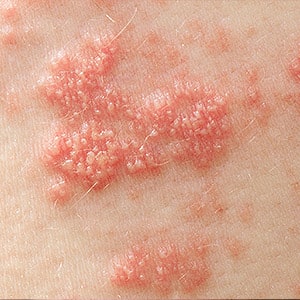
Varicella, more commonly known as chicken pox, is a viral infection that mainly affects children. Fortunately, the itchy blisters and other symptoms associated with it usually clear up on their own. But the virus itself, varicella zoster virus (VZV), can remain behind and become dormant.
Fast-forward a few decades, and the child once with chicken pox is now an adult, usually over 50. In 20-30% of former chicken pox patients, the virus reactivates as a new infection known commonly as shingles.
Shingles often begins with an itching, burning or numbing sensation on the skin that develops into a severe rash. Because of its effect on surface nerves, the rash often takes on a striped or belt-like pattern on the skin. A shingles outbreak can also cause fever, fatigue and pain, the latter of which in rare cases can be quite severe.
Shingles in its early stages is also highly contagious, transmitted easily through either physical contact with the skin lesions or through airborne secretions. This is especially troubling for certain groups: pregnant women, patients undergoing cancer or other serious disease treatment, or those with compromised immune systems. For them, shingles can pose a significant risk for complications.
Because of its easy transmission, and the danger it can pose to certain groups, dentists typically postpone treatment—even routine dental cleanings—for patients experiencing a shingles outbreak, especially a facial rash. Once their outbreak subsides, those procedures can be rescheduled.
If you develop what you think is shingles, you should seek medical attention as soon as possible. Certain prescribed antiviral medications can ease the symptoms and hasten recovery, but they’re most effective if started within three days of the onset of the disease. There’s also an effective vaccination for shingles recommended for people over 60 to help avoid the disease altogether.
One other thing! If you do develop shingles and have an upcoming dental appointment, let your dentist know. Better to reschedule your visit after you’ve recuperated than to put others’ health at risk.
If you would like more information on shingles and dental care, please contact us or schedule an appointment for a consultation. You can also learn more about this topic by reading the Dear Doctor magazine article “Shingles, Herpes Zoster.”
